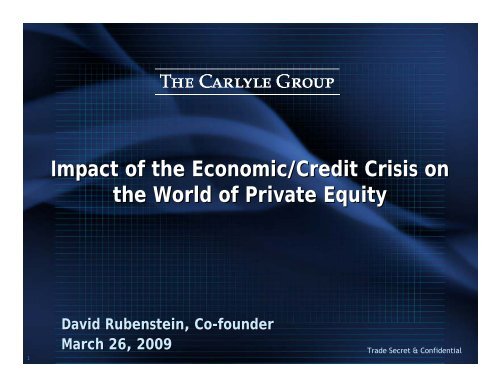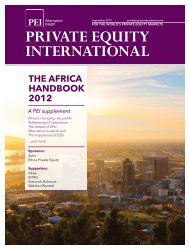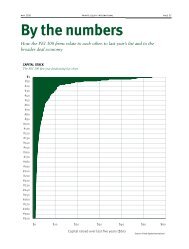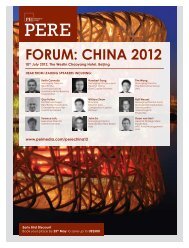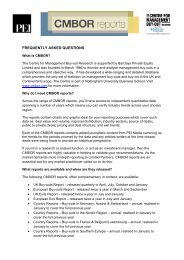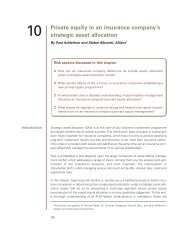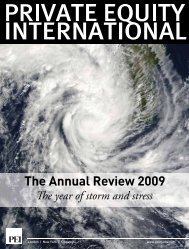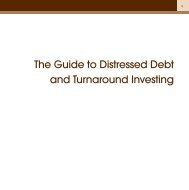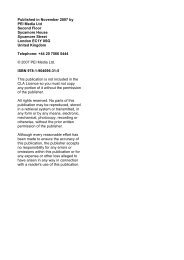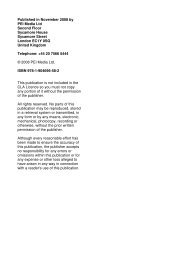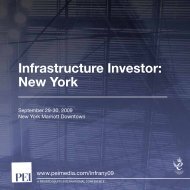Keynote Address - PEI Media
Keynote Address - PEI Media
Keynote Address - PEI Media
You also want an ePaper? Increase the reach of your titles
YUMPU automatically turns print PDFs into web optimized ePapers that Google loves.
Impact of the Economic/Credit Crisis on<br />
the World of Private Equity<br />
1<br />
David Rubenstein, Co-founder<br />
March 26, 2009<br />
Trade Secret & Confidential
Important Information<br />
This presentation has been prepared by The Carlyle Group (“Carlyle(<br />
Carlyle”) ) and is not intended for general distribution.<br />
It may only be used for informational purposes only. This presentation contains proprietary, trade-secret,<br />
confidential and commercially sensitive information and neither this presentation nor the information contained<br />
herein may be copied, disclosed or provided, in whole or in part, , to third parties without the prior written consent<br />
of Carlyle.<br />
Nothing in this presentation is intended to be taken by, and should not be taken by, any individual recipient as<br />
investment advice, a recommendation to buy, hold or sell any security, or an offer to sell or a solicitation of<br />
offers to purchase any security. An offer or solicitation for an investment in an investment fund managed or<br />
sponsored by Carlyle or its affiliates (“Fund(<br />
Fund”) ) will occur only through an offering memorandum and related<br />
purchase documentation, and subject to the terms and conditions contained in such documents and in the Fund’s<br />
operative agreements. The offering memorandum relating to the Fund contains additional information about the<br />
investment objective, terms and conditions of the Fund, tax information and risk disclosure that should be<br />
reviewed prior to making an investment decision regarding the Fund. This presentation is qualified in its entirety<br />
by such offering memorandum, which should be read completely before making any investment. An investment in<br />
a Fund would be speculative and would involve significant risks.<br />
Although the information presented in this presentation has been obtained from sources that Carlyle believes to<br />
be reliable, neither Carlyle nor the Company makes any representation as to its accuracy, validity, timeliness or<br />
completeness for any purpose. The information set forth herein does not purport to be complete and neither<br />
Carlyle nor the Fund is responsible for errors and/or omissions with respect to the information contained herein.<br />
Unless otherwise expressly stated herein any analysis or outlook relating to the securities discussed in this<br />
presentation express Carlyle’s s views only as of March 26, 2009. Past performance is not indicative of future<br />
results. Carlyle, its personnel and affiliates may give advice or take action in performing their duties for other<br />
clients, or for their own accounts, that differ from the analysis s and outlook set forth in this presentation.<br />
Certain of the information contained in this presentation represents ents or is based upon forward looking statements<br />
or information. Forward-looking statements are inherently uncertain, and changing factors, such as those affecting<br />
the markets generally, or those affecting particular industries or issuers, may cause events or results to differ<br />
from those discussed. Therefore, undue reliance should not be placed on such statements or the conclusions<br />
drawn therefrom, , which in no event shall be construed as a guarantee of future performance, results or courses of<br />
action. Carlyle and the Fund expressly disclaim any obligation or undertaking to update or revise any such<br />
forward-looking statements.<br />
2
How Private Equity in the Developed<br />
World Will Change in the Short Term<br />
3
Short Term Changes in the Developed<br />
Private Equity World<br />
1. Private Equity will not be as visible as it was in the 2003-7<br />
period ― far fewer large newsworthy occurrences<br />
2. Investments will be smaller and fewer<br />
3. Investments will require almost fifty percent equity in<br />
levered transactions; non-levered transactions ― minority<br />
stake transactions or investments into existing levered<br />
structures ― will increase relative to earlier years<br />
4. Distributions from earlier transactions will be fewer, and<br />
less attractive to selling gp's/lp's; IRR’s for those<br />
transactions will be lower than once projected<br />
5. Funds raised and invested in 2005-8 8 period will have lower<br />
IRRs ― returning capital may be top quartile performer<br />
4<br />
Trade Secret & Confidential
Short Term Changes in the Developed<br />
Private Equity World<br />
5<br />
6. New funds will be smaller ― back to pre 2004 sizes ― with<br />
terms much more favorable to lp's on fees, preferred<br />
returns, and investment period lengths. As a result, some<br />
firms will shrink their staffs and areas of focus<br />
7. Focus of much of PE activity will be on maintaining existing<br />
holdings’ viability if not value; re-purchasing debt will be a<br />
principal activity for gp's<br />
8. Some of the most visible transactions from 2005-8 8 will have<br />
to be restructured dramatically<br />
9. Investors will seek to reduce their private equity exposure<br />
― fewer new commitments and reducing existing<br />
commitments<br />
10. Government will likely increase oversight and taxation of<br />
private equity activity<br />
Trade Secret & Confidential
How Private Equity in the Developed World<br />
Will Change in the Longer Term<br />
6
Long Term Changes in the Developed<br />
Private Equity World<br />
7<br />
1. Flight to Quality will likely lead to a few very large PE<br />
firms with well known brand names and proven track<br />
records<br />
2. New firms will have a harder time gaining traction and<br />
funding<br />
3. Investments made now and over next few years will be<br />
at lower multiples and may produce very high returns in<br />
time<br />
4. Investors will return to private equity ― as best avenue<br />
for alternative investing returns<br />
5. Accounting rules will be modulated to avoid the<br />
excessive upward and downward valuations that might<br />
occur in a boom or bust period<br />
Trade Secret & Confidential
Long Term Changes in the Developed<br />
Private Equity World<br />
6. Non-PE firms will return to PE ― will re-establish establish PE arms<br />
and operations<br />
7. Lending will increase to more normal levels ― though on<br />
traditional lending terms<br />
8. Claw-backs from earlier funds will begin to impact some<br />
firms and funds<br />
9. American/British firms will cease dominating global PE ―<br />
though still major factors<br />
10. Private equity will become part of the normal, rather<br />
than alternative, investment world<br />
8<br />
Trade Secret & Confidential
Challenges for Private Equity in the<br />
Developed World<br />
1. Getting from the short term to the longer term<br />
2. Maintaining viability of investments made during the<br />
2004-7 7 period<br />
3. Maintaining strength of the PE organization<br />
4. Retaining investor support for private equity<br />
5. Finding new sources of capital ― equity and debt ― and<br />
new investments ― ones which can provide the type of<br />
return differential with public market indices so<br />
essential to private equity investors’ interest and<br />
support<br />
9<br />
Trade Secret & Confidential
Opportunities for Private Equity in the<br />
Developed World<br />
1. Becoming the preferred form of alternative investing<br />
2. Demonstrating the stability of the industry through bad<br />
times<br />
3. Improving the industry's image by working with<br />
companies hurt by the economic turmoil ― and now in<br />
need of private equity capital and skills<br />
4. Working with governments to solve its problems ―<br />
getting capital and investments back into the system,<br />
and turning around companies of concern to<br />
governments<br />
5. Achieving returns for investors commensurate with PE at<br />
its peak<br />
10<br />
Trade Secret & Confidential
How Private Equity in Emerging<br />
Markets Will Change in the Short Term<br />
11
Short Term Changes in EM Private Equity<br />
1. Investors will cut back private equity investing<br />
disproportionately to developed market investments<br />
2. Developed market general partners will focus less on<br />
emerging markets ― out of a concern for their developed<br />
market portfolios and needs<br />
3. Emerging market general partners will face portfolio<br />
valuation issues and operating performance issues ― just<br />
as in developed markets. But problems will actually be<br />
less than in many developed markets ― leverage is often<br />
not an issue; economies are still growing; populations<br />
are still growing; additional capital needs may be<br />
proportionately smaller<br />
12<br />
Trade Secret & Confidential
Short Term Changes in EM Private Equity<br />
4. The distinctions between various emerging markets will<br />
become more apparent to all ― Asia, India, Brazil, and<br />
Middle East will be seen as stronger. Africa, Russia,<br />
Central and Eastern Europe, Spanish-speaking speaking Latin<br />
America, and SE Asia will be seen as weaker<br />
5. Traditional emerging market patterns will emerge, at<br />
least for the weaker emerging markets ― developed<br />
markets pull back; emerging markets get left behind in<br />
resources and concerns<br />
13<br />
Trade Secret & Confidential
How Private Equity in Emerging Markets<br />
Will Change in the Longer Term<br />
14
Long Term Changes in EM Private Equity<br />
1. The on-going strength and viability of emerging markets<br />
― even weaker ones ― will be increasingly recognized<br />
2. Emerging market investments ― by limited and general<br />
partners ― will increase disproportionately to developed<br />
market investments<br />
3. Recognition will arise that less capital was lost<br />
proportionately than in the developed markets; and that<br />
emerging markets can yield higher returns than<br />
developed markets over time<br />
15<br />
Trade Secret & Confidential
Long Term Changes in EM Private Equity<br />
4. Private equity will become a larger economic factor in<br />
the more attractive emerging markets; and will actually<br />
be encouraged by governments (even if the capital is<br />
from abroad)<br />
5. Indigenous private equity industries will blossom to a far<br />
greater extent; and emerging markets will increasingly<br />
get larger shares of private equity investments from<br />
local and regional firms<br />
16<br />
Trade Secret & Confidential
Challenges for EM Private Equity<br />
17<br />
1. Convincing Investors that emerging markets are not going<br />
to fall apart or evaporate<br />
2. Proving the requisite additional capital and management<br />
skills to stabilize portfolio companies impacted by<br />
current economic downturn<br />
3. Demonstrating that returns in emerging markets can be<br />
far higher than in developed markets, with fewer<br />
problems in many countries and sectors<br />
4. Convincing governments that private equity will be long<br />
term investors ― worth govt. support and attention<br />
5. Distinguishing for investors the distinctions between the<br />
stronger and weaker emerging markets ― avoiding the<br />
trap of having all emerging markets lumped in one<br />
basket<br />
Trade Secret & Confidential
Opportunities for EM Private Equity<br />
1. Placing the emerging market PE industry on a firmer<br />
footing ― not as subject to market vagaries and investor<br />
panic<br />
2. Increasing the share of PE capital globally<br />
3. Growing strong indigenous PE franchisees ― so local and<br />
regional economies are not dependent on global or<br />
developed market PE firms<br />
4. Achieving extraordinary returns for investors from the<br />
depressed prices that will be available in many countries<br />
5. Having private equity become as important to emerging<br />
market economies as it has become for developed<br />
market economies<br />
18<br />
Trade Secret & Confidential
19<br />
Key Messages
Key Messages<br />
1. Emerging market private equity will grow, not decline<br />
2. Emerging market private equity may yield higher returns<br />
than developed market private equity<br />
3. The age-old challenge of convincing investors that the<br />
emerging markets are not to be abandoned in times of<br />
stresses will still be with us for the short term<br />
4. For the long term, emerging market private equity will<br />
become a stable, large, industry, not dependent<br />
principally upon developed market equity and firms<br />
5. Emerging markets have emerged, and are here to stay ―<br />
right alongside developed markets<br />
20<br />
Trade Secret & Confidential
Impact of the Economic/Credit Crisis on<br />
the World of Private Equity<br />
21<br />
David Rubenstein, Co-founder<br />
March 26, 2009


